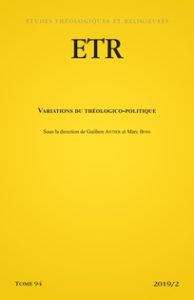Interrogeant le théologico-politique à partir d’un référentiel psychanalytique, Jean-Daniel Causse explicite et décline la formule de Lacan selon laquelle « l’inconscient c’est la politique ». Un premier temps consiste à situer l’inconscient du côté du réel en distinguant celui-ci de la réalité. Un deuxième temps est l’occasion d’articuler l’inconscient et la politique à partir d’une dialectique interne au réel entre l’automaton (répétition, nécessité) et la tuchè (événement, hasard). Ces éléments permettent, dans un troisième et dernier temps, d’effectuer une relecture politique de l’Ecclésiaste en attribuant au nom « Dieu » une fonction de réel susceptible de fonder un rapport particulier au champ de la réalité. Une voie s’ouvre pour habiter le monde du semblant de manière à la fois lucide et courageuse, sans céder aux illusions ni sombrer dans la résignation.
Politics of the Reality and Politics of the Real. In what Way is the Unconscious Political ?
Questioning the theological-political by using the frame of reference of psychoanalysis, the author clarifies and unfolds Lacan’s proposition: “The unconscious is politics”. First, he situates the unconscious on the side of the Real as opposed to reality; then he shows how the articulation of the unconscious and politics might hinge on dialectics within the Real, between automaton (repetition, necessity) and tuche (event, fate). Then, he proposes a new, political, reading of Ecclesiastes that attributes to the name of God a function in the Real that enables a particular connection to reality, thus showing a path towards dwelling in the world of semblance in a lucid and courageous way, giving in neither to illusions nor to resignation.
p. 337-346
Auteur
CAUSSE Jean-Daniel
Jean-Daniel CAUSSE (1962-2018) a été professeur d'éthique à l'Institut protestant de théologie, Faculté de Montpellier, puis professeur au département de psychanalyse de l'université Paul-Valéry Montpellier 3 et directeur du Centre de recherches interdisciplinaires en sciences humaines et sociales (CRISES - EA 4424).
